
English (965)
Children categories
We mourn
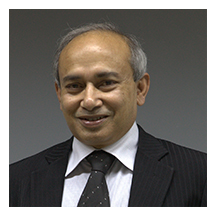 21 February 2015, Dhaka. Engineer Abul Iqbal Mohammed Monsoor, Director, Construction and Maintenance (Chief Engineer), BRAC passed away on Friday, February 20th, at 9pm at Apollo Hospital, Dhaka. He was 61 years old. Engr. Monsoor was the son of Late Md Azizur Rahman of Rangarchar, Ambari Bazar, Sunamganj. He completed his graduation in Civil Engineering from BUET in 1977. He is a life member and Fellow of the Institute of Engineers, Bangladesh and also a member of Canadian Council of Engineers.
21 February 2015, Dhaka. Engineer Abul Iqbal Mohammed Monsoor, Director, Construction and Maintenance (Chief Engineer), BRAC passed away on Friday, February 20th, at 9pm at Apollo Hospital, Dhaka. He was 61 years old. Engr. Monsoor was the son of Late Md Azizur Rahman of Rangarchar, Ambari Bazar, Sunamganj. He completed his graduation in Civil Engineering from BUET in 1977. He is a life member and Fellow of the Institute of Engineers, Bangladesh and also a member of Canadian Council of Engineers.
Engr Monsoor leaves behind his wife Dr. Taslima Monsoor, Dean of the Faculty of Law, Dhaka University and a daughter and son.
His qulkhani and milad mahfil will be hosted by BRAC and his family on 27 February 2015(Friday) after Asaar prayer. His friends, colleagues and well wishers are cordially invited to attend his qulkhani.
-the BRAC family
Microfinance Leaders Welcome Two New Members to Join Working Group
12 February 2015, WASHINGTON, DC – The Microfinance CEO Working Group welcomes two new members to their international collaboration: Lauren Hendricks, Executive Director of CARE’s Access Africa program, and Shameran Abed, Director of BRAC’s microfinance program. Tanzania-based Hendricks and Bangladesh-based Abed join the Working Group’s efforts to support the positive development of the microfinance industry, so the field can reach its full potential of bringing responsible microfinance and related services to those who have been traditionally excluded.
“The Microfinance CEO Working Group has worked hard to foster a diverse, collaborative and honest platform for advancing our industry’s mission to reach the 2.5 billion people around the world without access to the formal financial system. As leaders from BRAC and CARE’s Access Africa program, Shameran and Lauren complement our global perspective and bring innovative approaches to financial inclusion to our group. We’re thrilled to welcome them as new members, and they are already adding value and perspectives,” Mary Ellen Iskenderian, Co-Chair of the Microfinance CEO Working Group and President and CEO of Women’s World Banking.
In early 2011, an informal group of industry leaders met to discuss the state of the microfinance sector as it matures and encounters new challenges. Participants quickly discovered a shared perspective on the future of the microfinance industry – one rooted in high standards, client orientation, transparency and collective action.
That group formalized to create the Microfinance CEO Working Group, which has spent the last four years advocating in support of responsible microfinance and championing promising ideas and solutions for the industry. Today, the Working Group’s networks collectively represent more than 230 microfinance institutions across nearly 75 countries serving more than 57 million clients. The group supports initiatives that are playing a major role in advancing responsible microfinance, including client protection, pricing transparency and the Universal Standards for Social Performance Management. The members of the Microfinance CEO Working Group also provide forums for collaboration and information sharing among like-minded allies, including investors, funders, regulators, researchers and the broader international development community.
Hendricks is the Executive Director of CARE’s Access Africa program. Launched in 2008 to advance financial inclusion across the continent, Access Africa was built on CARE’s nearly 20 years of experience harnessing the ancient practice of savings groups and creating a sustainable system of home-grown microfinance. CARE’s Village Savings and Loan Associations (VSLAs) are built entirely on member savings and interest from loans; they receive no direct capital investment from CARE. However, their members do receive a year of intensive training from CARE in group dynamics and governance and in money management. This training enables the groups to become self-supporting, to flourish and even to establish and train other groups. Today, the Access Africa program is reaching 4.2 million people across 26 countries in Africa.
“The Microfinance CEO Working Group is all about collaboration in a shared commitment to financial inclusion. On behalf of CARE, I’m honored to join this diverse group of leaders to support sustainable and holistic solutions for the world’s poor,” said Hendricks.
Abed is the Director of the BRAC microfinance program, which serves more than five million clients in seven countries in Asia and Africa, and has total assets exceeding USD 1 billion. Starting its work in the early 1970s, BRAC was one of the first organizations to use the modern microfinance model of lending small amounts to groups of women.
Today, BRAC’s microfinance activities are offered through a unique “credit-plus” approach, addressing the special needs of various target populations such as rural women, youth and adolescents, landless poor, marginal farmers, migrant workers and small entrepreneurs. BRAC targets and develops customized financial products and services to best meet the varying needs of the poor.
“BRAC shares the Microfinance CEO Working Group’s commitment to promoting the best practices of our industry. This is an opportunity to collaborate with a group that embraces both the latest innovations and the trusted long-standing practices that bring financial tools and other resources to those who need them most,” said Abed.
Hendricks and Abed join the following leaders from founding member organizations of the Microfinance CEO Working Group: Michael Schlein, President and CEO of Accion; Rupert Scofield, President and CEO of FINCA International; Steve Hollingworth, President of Freedom from Hunger; Co-Chair Alex Counts, President and CEO of Grameen Foundation; David Simms, Global Chief Development Officer and President, Opportunity International, U.S.; Rosario Perez, President and CEO of Pro Mujer; Scott Brown, President and CEO of VisionFund International; and Co-Chair Mary Ellen Iskenderian, President and CEO of Women’s World Banking.
This article was orignally posted here: http://microfinanceceoworkinggroup.org/press-release-microfinance-leaders-members-join-working-group/
Maya Apa - Help at hand - Bangladesh’s first app by women for women
02 February 2015, Dhaka. In partnership with BRAC, maya.com.bd has launched the first ever one-touch help service app for women in Bangladesh. ‘Maya Apa’ is an android-based mobile application, designed, developed, and implemented by female engineers, doctors, and entrepreneurs. It allows women (or any other user) to post questions anonymously, on health, legal and psychosocial issues. Within 48 hours, experts respond with tailor-made answers.
Maya Apa mobile app is based on the hugely successful web application ‘Maya Apa Ki Bole’ on maya.com.bd’s website, the first anonymous question and answer platform in the country. Users can log in via their email address to post questions, allowing them to retain their anonymity. The platform is curated in both English and Bangla, where experts – a team of doctors, lawyers and psychosocial counsellors –respond in the language preferred by the users.
With the service developed for basic smartphones, BRAC Maya team is aiming to reach women and girls in both urban and rural areas of Bangladesh. At the app launch, director of BRAC’s gender, justice and diversity, Sheepa Hafiza stated, “This app will not only create a greater access to information and services for women all over the country but also a nationwide consensus for a supportive society.”
The app sets a precedence in the booming start-up culture whereby two female engineers developed a one-touch service app for women in Bangladesh. Achia Khaleda Nila and Shubrami Moutushy Mou, the developers of the application, believe that this ‘one of a kind’ app is instrumental in empowering women through technology.
Ivy H Russell, founder of Maya, added "We are motivated to continue innovating with the Maya Apa app. Our mission is to connect women to the knowledge they are looking for through technology, and there is a lot more on the roadmap this year”. The app aims to bridge the digital divide by providing information to women, and empowering women of all walks of life in Bangladesh. The Maya Apa app is launching in both Bangla and English on 3 February2015. It can be found on Google Play Store for immediate download and usage.
Download the app from Google play store.
BRAC launches new research website
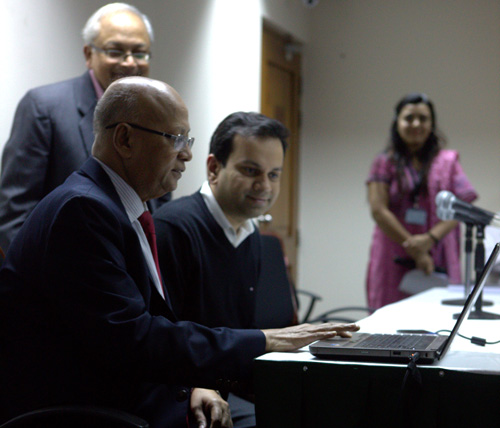
01 February 2015, Dhaka. BRAC's research and evaluation division launched its new website research.brac.net today. This new initiative was taken with the aim to disseminate its research publications to a wider audience as well as to bring research more prominently in development discussions. Integrating many features of web 2.0, the new website presents augmented user interactivity and mobile friendliness with clear navigations. The publications can be now read online plus social media tools have been amalgamated for easy sharing of information.
Dr Mahabub Hossain, the advisor to BRAC's executive director and present head of RED, chaired the launching event. It was attended by the senior director of BRAC’s strategy, communications and empowerment Asif Saleh was also present along with representatives from BRAC University, BRAC International and RED programme staff.
BRAC receives 14th World Toilet Organization Hall of Fame Award
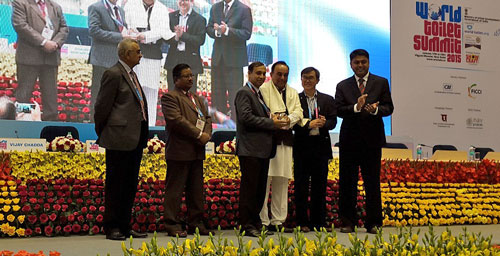
21 January 2015, Dhaka. World Toilet Organization (WTO) gave “Hall of Fame Award" to BRAC for significant contribution in Sanitation sector in Bangladesh. Director of BRAC WASH and DECC and TB programme, DrAkramul Islam received the awardat the 14th World Toilet Summit India in Delhi from Dr. Subramanian Swamy, MP & Former Minister of India and Jack Sim, Founder of WTO.
Minister Devendra Chaudhry, Special Secretary, Ministry of Power, India was also present in the occasion along with representatives from governments, donors, development partners, business sectors, NGOs and media.
Bangladesh has made remarkable progress in providing basic sanitation services to its people. It is now estimated that throughout Bangladesh, 57% use sanitary latrines. Open defecation has almost ended with only about 3% of the people not using toilets of any kind. The BRAC hygiene and sanitation programme reached more than 66 million people.
BRAC WASH and related programmes have made a substantial contribution to the nation's Millennium Development Goal (MDG) targets for water, sanitation and health and will continue to contribute to the Sustainable Development Goals (SDGs). Over 8 years, the BRAC hygiene and sanitation programme reached more than 66 million people, about half of the rural population of Bangladesh. It has successfully worked to improve household sanitation by creating demand for hygienic latrines [2] while supporting an extensive supply chain and local businesses. Current coverage with hygienic and adequately maintained toilets is 82% in the 152 districts where BRAC has worked. All these successes have been underpinned by a strong provision of service to the poor and ultra-poor and by a unique hygiene promotion programme focusing on universal use and sustainability of services in communities, households and schools.
Open defecation in country has been reduced from 42% in 2003 to 3% in 2012
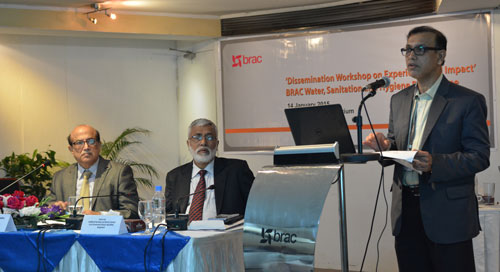
14 January 2015, Dhaka. BRAC’s Water, sanitation and Hygiene programme held a dissemination and impact sharing workshop on 14 January 2015 at BRAC Centre to share its experience and future strategy with the stakeholders.
BRAC started its WASH programme in 2006 to tackle contamination issues. The significant achievement of reducing open defecation from 42% to 3% (from 2003-2012) was the major finding of the research. The programme works through an intensive implementation strategy to reach rural population from all walks of life. Starting from individual household visits, cluster meetings, schools, mosque forums, formation of village WASH committees promoting rural sanitation centres and regular advocacy workshops are the key implementation strategies of the programme.
BRAC’s vice chairperson and interim executive director Dr Ahmed Mushtaque Raza Chowdhury chaired the workshop where director of BRAC’s WASH programme gave the keynote presentation on the future strategy for BRAC’s WASH programme. Ms Martine van Hoogstraten, deputy head of mission, head of economic affairs and development cooperation, Embassy of the kingdom of the Netherlands in Dhaka and additional secretary of ministry of LGRD ms Zuena Aziz were present as guests of honour.
BRAC Sierra Leone empowers child Ebola survivors and adolescent girls in collaboration with Ministry of Social Welfare Gender and Children’s Affairs
7 January 2015, Sierra Leone.
Interventions include cash transfers, radios and safe spaces for girls; efforts will help recovery efforts by providing livelihood assistance for affected families and support for adolescent girls
BRAC, in collaboration with the Ministry of Social Welfare Gender and Children Affair (MSWGCA), has started distributing cash grants to young Ebola survivors with the aim of starting small livelihood activities, while also supporting adolescent girls in Ebola recovery efforts.
Distributed in the districts of Port Loko, Kambia, Moyamba and Pujehun, the cash grants have been given to orphans below the age of 22, sexually abused children, and families with children affected by Ebola. The grant amounts consist of two disbursements of 200,000 leones ($47) each, paid one month apart. BRAC is targeting 1,050 beneficiaries within the four districts, with 96 having receiving payments as of January 7. The initiative is funded by UNICEF Sierra Leone.
Meanwhile, BRAC is also working to close the gaps created by schools closures in the wake of the Ebola crisis. Its Empowerment and Livelihood of Adolescents (ELA) project is providing 840 radio sets (four for each of 210 communities), along with textbooks, exercise books, pens and pencils to boost the learning capacity of non-school goers. This promotes the Ministry of Education’s Emergency Radio Teaching programme which has immensely helped adolescents and children stay focused. The BRAC intervention targets 24 chiefdoms in Port Loko, Kambia, Moyamba, and Pujehun.
With schools and most recreational centres closed amidst the economic crisis, girls have been limited in movement and confined to their homes. This creates a stressful situation in families and communities while exposing adolescent girls to abuse, violence, and exploitation. BRAC has synced its Ebola-related activities to existing efforts to end child marriage and teenage pregnancy, as these issues are all closely related.
Funded by UNICEF, BRAC’s Empowerment and Livelihood for Adolescents (ELA) programme provides safe spaces for adolescent girls, life-skills and livelihood training, microloans and community mobilization for reduction of teenage pregnancy and child marriage. It is a part of a network of girls’ clubs in five African countries with 77,000 members as of November 2014.
The existing ELA clubs’ spaces have also been used as social centres for the communities, supporting mentors to provide sexual and reproductive health training for adolescent boys and girls in smaller groups of five. The mentors, well-trained on key Ebola messages, in turn conduct door-to-door Ebola sensitization meetings and soap distribution near the clubs. Educational materials are also offered, turning the clubs into community libraries.
Owing to the fear of Ebola survivors being stigmatized, staffs and mentors have been trained on how to counsel and give support, such as psychosocial and psychological training, to people affected by the disease, helping them integrate back in their communities after treatment.
Bangladesh Girl Summit 2014 Pledges concerted effort to end child marriage
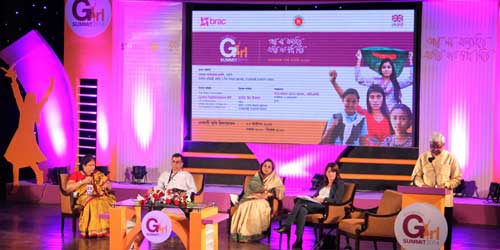
Despite Bangladesh has made significant progress in major human development indicators, including education, healthcare and child and maternal death, it has yet to go far to achieve a satisfactory result in reducing child marriage. Bangladesh has the highest child marriage rate in south Asia while fourth highest in the world. To end child marriage the government, civil society, media and social and political leadership must join hand and take up strong and well-coordinated effort.
Experts said these at the 'Bangladesh Girl Summit 2014' today (Monday October 27) held at the Osmani Memorial Auditorium in the capital. The summit was held with an aim to raise an effective movement for the empowerment and development of girl children through preventing child marriage. BRAC took the initiative for this summit for the first time with support from Ministry of Women and Children Affairs and the Department for International Development (DFID). The event was organised by the National Committee for Bangladesh Girl Summit 2014, a committee which was formed by 23 organisations including BRAC.
Meher Afroze Chumki MP, State Minister of the Ministry of Women and Children Affairs, Government of the People’s Republic of Bangladesh, attended the event as the chief guest. Lynne Featherstone MP, UK minister for international development, and Tariq-ul-Islam, secretary, Ministry of Women and Children Affairs, were present as special guests. Sir Fazle Hassan Abed, KCMG Founder and Chairperson of BRAC, chaired the event.
The daylong event started with the theme song of the event performed by a group led by famous singer Kona. Later interactive, live sessions were held participated in by stakeholders who declared solidarity and pledge against child marriage. An innovative 'Youth Voice' session was also arranged to bring forth the voices of the youth. Sheepa Hafiza, Director, Gender, Justice & Diversity and Migration Programme, gave the welcome speech. Noted writer and Chairperson of Bangladesh Shishu Academy, Selina Hossain, and Campaign For Popular Education Chairperson Rasheda K Choudhury also attended the event.
State Minister Meher Afroze Chumki said, 'Seventy per cent of women who are victims of torture in Bangladesh are from an age range of 13-18 years. Child marriage seriously affects work skill, which eventually affects the overall human rights situation. It is the reason Bangladesh government has taken up ending child marriage as its number one challenge'.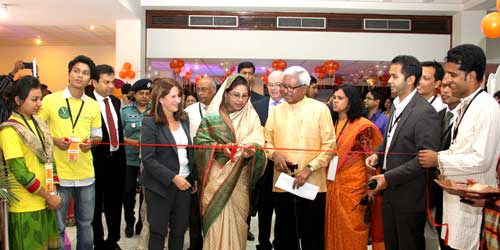
Ms Lynne Featherstone praised Bangladesh for its commitment pronounced at the July Girl Summit in London to end child marriage. 'Every girl has a right to childhood, and to a life free from violence and poverty. We must all play our part to alter girls’ social expectations, see them as valuable members of society, sources for hope for the future, and investments worth making,' she said.
Sir Fazle Hasan Abed, Chiarperson, BRAC said, 'The practice of child marriage has many deleterious effects on the societies where it occurs. Most obviously, it hurts the girl child herself by curtailing her opportunities for education and compromising her health and safety, thereby limiting her chances of achieving her full potential. There is also a profound impact on the next generation. South Asia is home to the highest number of malnourished children in the world. Girls who marry and bear children in their teens are unable to support the optimal growth and development of their offspring during pregnancy and the early years, resulting in significant numbers of low birth-weight babies and malnourished children'.
Bangladesh Girl Summit has been inspired by the UK Girls Summit held in London on July 22 this year and attended by the honourable Prime Minister of Bangladesh, Sheikh Hasina, and other world leaders. The event is an outcome of a continued effort to bring together diverse groups and actors to build a collective commitment against child marriage, paving the way for initiatives that would bring an end to this vicious practice once and for all.
Ten years on, post-tsunami Sri Lanka charts a course for global crisis zones
26 December 2014, New York.
“From Aid to Enterprise,” a case study released by BRAC on the 10th anniversary of the Indian Ocean tsunami, suggests a path from grant-based aid to sustainable interventions and for-profit enterprise.
Mangalika and her husband, K.G. Sirisena, recall the wall of water that swept over their home in coastal Sri Lanka ten years ago. “Eight feet of water came into the house,” she says. “The only things left were the clothes we were wearing. We were lucky to escape with our lives.”
Dec. 26 marks the 10-year anniversary of the Indian Ocean earthquake and tsunami, one of the deadliest natural disasters in recorded history. An estimated 230,000 people in 14 countries lost their lives in the disaster and immediate aftermath.
To mark the anniversary and highlight the possibilities for renewal in areas hit by wars, epidemics and natural disasters, BRAC, the development organization based in Bangladesh, has released a case study on its experience in Sri Lanka, “From Aid to Enterprise: BRAC’s Evolution from Relief to Sustainable Financial Services in Sri Lanka.”
Mangalika and her husband, featured in the report, were running a home-based business servicing Singer-branded and other electronic appliances, employing 12 part-time employees and making a profit of roughly $750 a month. The tsunami laid waste to their business along with countless others.

Mangalika with her husband and three sons in front of the family's new repair center.
"Crises of historic magnitude can lead to equally historic gains if women have the tools they need to seize control of their lives and wellbeing." – Susan Davis
Mangalika rebuilt her business with microfinance loans from BRAC, using small loans to purchase spare parts such as motors, compressors and fans and power. “We were determined to re-build what we had, no matter what,” she says. “BRAC’s loans allowed us to do that.”
In “From Aid to Enterprise,” officials at BRAC discuss the challenges of transitioning an initially grant-funded nonprofit development organization into a sustainable microfinance institution, and in this case a for-profit microfinance provider eventually sold to the private sector in 2014.
“At BRAC, our objective is not to create a surplus for investors, or to perpetually use donor funds,” says S.N. Kairy, group CFO of BRAC and BRAC International. “It is to sustainably serve poor people. We prefer to start with subsidy and donor funds, and then gradually move to sustainability. That movement has to be driven by clients and their own ability to borrow greater amounts in their own time.”
A path forward
“From Aid to Enterprise” suggests a path for other countries in a post-conflict or post-disaster stage.
January marks the five-year anniversary of the earthquake that destroyed large parts of Haiti, for instance. BRAC entered Haiti shortly after the earthquake and now runs a center that provides artificial limbs and orthotic devices for those in need. Modeled on a similar BRAC center in Bangladesh, the BRAC Limb and Brace Center in Haiti is on a path toward full cost recovery.
The experience of BRAC in Sri Lanka also offers hope for recovery from the Ebola epidemic currently devastating parts of West Africa, according to Susan Davis, president and CEO of BRAC USA.
“Despite the situation we find ourselves in today with the rapidly unfolding crisis in West Africa due to the spread of the Ebola virus, it's worth looking at trends from recent decades to understand how philanthropic capital can build models of sustainability,” Davis wrote in The Huffington Post recently. “Crises of historic magnitude can lead to equally historic gains if women have the tools they need to seize control of their lives and wellbeing.”
BRAC operates microfinance, agriculture, girls’ empowerment and education programs in Sierra Leone and Liberia, and is part of the Ebola Survival Fund, a coalition of nongovernmental organizations determined to crush Ebola.
“From Aid to Enterprise” documents the rare trajectory of BRAC’s operations in Sri Lanka, evolving from philanthropically funded relief operations to a commercial financial services company serving the poor.
Livelihoods lost and regained
More than 35,000 people lost their lives in Sri Lanka during the Indian Ocean tsunami. More than 800,000 were displaced, and according to official estimates, more than 150,000 people lost their livelihoods. About 90% of those affected lost productive assets, including their dwellings.
BRAC’s initial post-tsunami relief interventions in Sri Lanka were geared towards recovery and rehabilitation efforts, including the cleaning and disinfesting of contaminated water wells, constructing latrines to prevent health hazards, and replacing lost and damaged school materials. Beginning in 2006, as the need for immediate disaster relief and rehabilitation efforts subsided, BRAC moved towards providing micro-loans and facilitating economic development at the community level.
BRAC took a phased approach to entering the sustainable microfinance sector. Within a year of operations, it had reached more than 26,000 clients, making it a significant microfinance provider in Sri Lanka. Starting in 2007, selected clients – mostly women heads of households, widows, and those without other assistance – began receiving training on poultry and livestock rearing, agriculture, and enterprise development. Women were trained in basic business planning, assessing the market, locating wholesale options, handling day-to-day bookkeeping, and interacting with customers. A capacity development program also helped strengthen other local organizations.
Regulatory hurdles for microfinance
A local microfinance expert quoted in “From Aid to Enterprise” credited BRAC’s robust growth with “well established management practices, systems, and a ready methodology largely replicated from Bangladesh.”
By 2007, the company had evolved to a fully-fledged microfinance operation, and a near replication of BRAC’s microcredit model in Bangladesh BRAC scaled its operations to a portfolio of over USD 11.2 million, serving 74,000 borrowers at its peak in 2011.
After 2011, BRAC loan portfolio began to contract as a result of capital constraints that resulting partly from Sri Lanka’s lack of regulatory framework. There were ambiguities and restrictions on how microfinance organizations could fund their operations. BRAC’s legal structure effectively prohibited it from borrowing funds on a commercial basis from international sources, and its ability to finance operations through savings deposits was constrained by government directives, resulting on a squeeze on access to capital.
In June 2013, BRAC partnered with Lanka Orix Leasing Group (LOLC), a longstanding provider of leasing and insurance and other financial products in Sri Lanka with its own existing microfinance practice (LOLC Micro Investment Ltd), to acquire a majority stake in a regulated financial services company, the for-profit Nanda Investment and Finance PLC (NIFL). In 2014, in response to new changes to the Sir Lankan central bank’s capitalization requirements, the board of BRAC International sold its 59.33% stake in the jointly held company, BRAC Lanka Finance PLC, to Commercial Leasing and Finance PLC, a subsidiary of its partner, LOLC.
The sale was completed in September 2014, marking BRAC’s exit from Sri Lanka and ending a successful transition from aid to enterprise.
“Sri Lanka is successful because we started with grant funding,” says Kairy. “This is the best way to set up, as it allows you to really reach the poor, and then allows a path for sustainability to emerge. If there is no grant, then in effect, you are serving a higher income portion of the population, perhaps the moderate poor. But to eventually get to a place of sustainability while serving the poorest, an organization needs some level of subsidy at the start.”
Download the full Sri Lanka case study, “From Aid to Enterprise,” here.
BRAC Uganda awarded at the 2014 Financial Reporting (FiRe) Awards
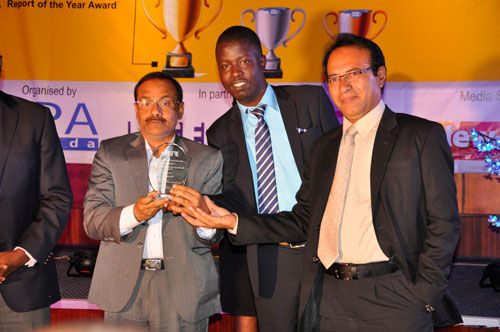
16 November 2014, Dhaka. On 6 November 2014, BRAC Uganda was recognised for its financial reporting system when it became the first runner up in the NGO category at the 2014 Financial Reporting (FiRe) Awards-Uganda, at the Kampala Serena Hotel.
BRAC Uganda has participated in the FiRe awards for the past three years, and has been recognised as the best NGO in both 2011 and 2012 and became the first runner-up in the same category in 2013.
This year, BRAC Uganda competed against 16 NGOs’ and 75 various sectors such as banking services, consumer and industrial products, education institutions, insurance services, the public sector and regulatory bodies and associations.
BRAC Uganda country representative Md Abul Kashem Mozumder, programme manager for microfinance Md Rafiqul Islam and country head of accounts Daniel Businge represented BRAC at the event and received the trophy and certificate.
The guest of honour at the event was the Speaker of the Uganda Parliament Rebecca Kadaga, and she was accompanied by the Minister of Finance, Planning and Economic Development Maria Kiwanuka. The FiRe Awards was inaugurated in 2011 with the aim to promote a standard financial reporting system in compliance with the International Accounting Standards Board (IASB). The awards are organised by the Council of the Insititue of Certified Public Accountants of Uganda (ICPAU).
Join the world’s biggest family




